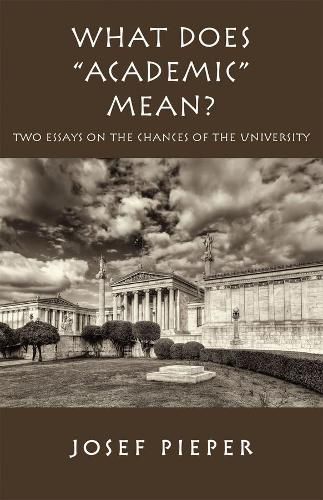Readings Newsletter
Become a Readings Member to make your shopping experience even easier.
Sign in or sign up for free!
You’re not far away from qualifying for FREE standard shipping within Australia
You’ve qualified for FREE standard shipping within Australia
The cart is loading…






What Does Academic Mean? focuses, in two essays, on the prospects of contemporary universities. The term academic is traced back to Plato’s Academy in a grove in Athens. The Academy is isolated, far away from the hustle and bustle of the city. Western universities founded in the Middle Ages show continuity, via Byzantium, with Plato’s Academy. Not surprisingly, the Oxford Dictionary quoted by Pieper defines academic as Not leading to a decision; unpractical.
The preoccupation of the academic as academic is seen by Pieper to be fundamentally theoretical, not practical. Pure theory is that which cannot at all be pressed into service. Clearly, many university disciplines that are richly funded by industry and business concerns tend to be favored by university administrations, which, intent on financial survival, frown on unproductive disciplines such as pure philosophy: metaphysics being a case in point, since it is the discipline least capable of practical application. Pure philosophy, unlike any other discipline, has as its subject the totality of being. Every other discipline deals with a particular aspect of being - for example, the physical, the psychological, the technical - but not the totality. For Pieper, spirit is that which makes us open to truth - all truth - without any need to exploit it in the concrete world. The sciences open up more and more access to reality, more and more for us to contemplate. They show us more of the totality, but none of the sciences is interested in the totality as such. The philosophy which deals with the totality and asks, with Alfred North Whitehead, What is it all about? is seen by Pieper as central to the university. Essentially, it contemplates the wonder of being.
$9.00 standard shipping within Australia
FREE standard shipping within Australia for orders over $100.00
Express & International shipping calculated at checkout
What Does Academic Mean? focuses, in two essays, on the prospects of contemporary universities. The term academic is traced back to Plato’s Academy in a grove in Athens. The Academy is isolated, far away from the hustle and bustle of the city. Western universities founded in the Middle Ages show continuity, via Byzantium, with Plato’s Academy. Not surprisingly, the Oxford Dictionary quoted by Pieper defines academic as Not leading to a decision; unpractical.
The preoccupation of the academic as academic is seen by Pieper to be fundamentally theoretical, not practical. Pure theory is that which cannot at all be pressed into service. Clearly, many university disciplines that are richly funded by industry and business concerns tend to be favored by university administrations, which, intent on financial survival, frown on unproductive disciplines such as pure philosophy: metaphysics being a case in point, since it is the discipline least capable of practical application. Pure philosophy, unlike any other discipline, has as its subject the totality of being. Every other discipline deals with a particular aspect of being - for example, the physical, the psychological, the technical - but not the totality. For Pieper, spirit is that which makes us open to truth - all truth - without any need to exploit it in the concrete world. The sciences open up more and more access to reality, more and more for us to contemplate. They show us more of the totality, but none of the sciences is interested in the totality as such. The philosophy which deals with the totality and asks, with Alfred North Whitehead, What is it all about? is seen by Pieper as central to the university. Essentially, it contemplates the wonder of being.